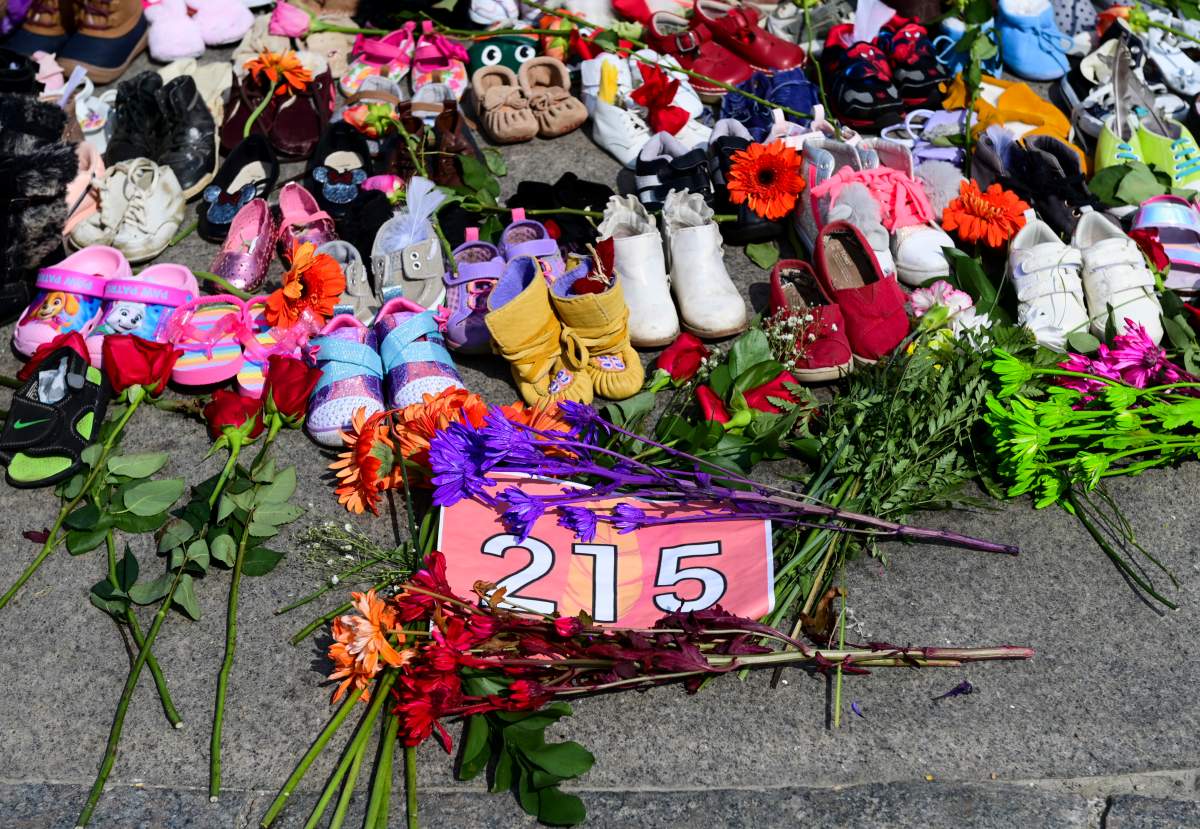Every Child Matters. We’ve heard these words a lot this week.

I am horrified by the discovery of 215 children’s bodies at a residential school near Kamloops, B.C., last week.
While we have seen an outpouring of support — tiny shoes placed on the steps of public buildings, flags flown at half-mast, words of anguish shared across social media — I am disturbed by a lack of outrage from so many others. The silence is deafening. Is Indigenous grief not our collective grief?
I am reminded of the Humboldt bus crash in 2018 which claimed 16 lives and how our entire country mourned. It was a horrific loss — one for which I too wept — yet I do not feel the same sense of collective national grieving this past week. Yes, every child matters, but some seem to matter a lot less.
Because if every child mattered, why is it that six years after the Truth and Reconciliation Commission report, which had an entire 266-page chapter dedicated to missing and murdered children, was there so little haste in finding them? Would the bodies have been found had the Tk’emlúps te Secwépemc First Nation not taken it upon itself to use ground-penetrating radar technology to find them?
More than 150,000 children were torn from their homes and sent to residential schools between 1863 and 1996. I was a teenager in 1996. This is not ancient history.

Why are we not more outraged that so many First Nations communities still do not have clean drinking water on reserves, that they suffer greater rates of suicide, addiction, homelessness, that they are significantly overrepresented in killings by police, that they face racism in the health and social service system.
We watched on video the verbal attacks hurled on Joyce Echaquan before her death in a Joliette, Que., hospital. Do her motherless children not matter?

Get daily National news
June is National Indigenous History Month in Canada. It is a month to honour the history, heritage and diversity of Indigenous peoples in Canada. Several planned events and campaigns to celebrate Indigenous joy have been put on pause as communities mourn. We are meant to be recognizing the strength of Indigenous communities. Their resilience humbles and pains me.
“As an Indigenous business leader, the role I fit best into (from my perspective) is to show our kids what we are capable of despite all the trauma. Personally, this past weekend was raw with emotion,” wrote Jennifer Harper, founder of Cheekbone Beauty, in an email to me this week.
We must be clear. This is not, as Prime Minister Justin Trudeau tweeted last week, merely a “dark and shameful chapter of our country’s history.”
This is a significant underlier of our country’s history. Residential schools pre-date this country’s 1867 Confederation and continued after the Charter of Rights and Freedom was written in the 1980s.
Residential schools, built in nearly every province and territory, aimed to “take the Indian out of the child.”
Duncan Campbell Scott, deputy superintendent of Indian Affairs from 1913 to 1932, is often quoted as saying: “Kill the Indian, save the man.”
Residential schools are where thousands of children suffered sexual abuse, physical abuse, deprivation, malnourishment, medical experimentation, cruelty, torture and murder. Half of the children did not return home. Now 215 of those children have been found, but thousands more are expected to be discovered. This is Canada’s genocide. These are the sins of our country.

“All Indigenous Peoples living today in Canada are survivors of Canada’s tools of genocide. We are survivors of residential schools. We are survivors of the Indian Act. We are survivors of the Sixties Scoop and survivors of the ongoing systemic racism which attempts to erase us,” Kiiwetinoong MPP Sol Mamakwa said in the Ontario legislature on Monday.
“But we are still here.”
Looking back on my own miseducation, I never learned about residential schools in my formal schooling. The first time I heard about residential schools was hearing Gord Downie sharing Chanie Wenjack’s story. Chanie was a young boy who died on Oct. 22, 1966, walking the railroad tracks, trying to escape and return home from the Cecilia Jeffrey Indian Residential School. Chanie’s home was 400 miles away.
Over the last several years, I am learning that my beloved Canada is not the Canada I once thought it was. I am learning that history must be re-written so we can see the picture in its fullness, not the one painted through the colonizers’ rose-rimmed glasses.
I am learning that I have an active role in this, too. While I hold our government and the Catholic church responsible for much of this carnage, I must hold myself accountable, too.
As a settler, it is my responsibility to do the work to learn more and advocate for Indigenous People — I may not have caused it, but I have benefited from their suffering.

I must acknowledge the sins on which this country has accumulated its wealth and prosperity. I must acknowledge the privilege I am granted in my children’s well-being and safety has come at an immeasurably grave cost to other children.
It is not enough to say every child matters. We must act like every child matters.
The Indian Residential Schools Crisis Line (1-866-925-4419) is available 24 hours a day for anyone experiencing pain or distress as a result of their residential school experience.
—
Meera Estrada is a cultural commentator and co-host of kultur’D! on Global News Radio 640 Toronto.







Comments
Want to discuss? Please read our Commenting Policy first.